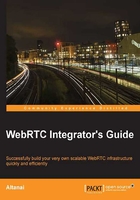
Conventions
In this book, you will find a number of styles of text that distinguish between different kinds of information. Here are some examples of these styles, and an explanation of their meaning.
Code words in text, database table names, folder names, filenames, file extensions, pathnames, dummy URLs, user input, and Twitter handles are shown as follows: "We saw how to program the three basic APIs of WebRTC media stack namely, getUserMedia, RTCPeerConnection, and DataChannel."
A block of code is set as follows:
public class loginServlet extends HttpServlet {
public loginServlet() {
super();
}
...
Any command-line input or output is written as follows:
ws://ns313841.ovh.net:10060/ Request Method: GET Status Code: 101 Switching Protocols
New terms and important words are shown in bold. Words that you see on the screen, in menus or dialog boxes for example, appear in the text like this: "As peer 1 keys in the message and hits the Send button, the message is passed on to peer 2."
Note
Warnings or important notes appear in a box like this.
Tip
Tips and tricks appear like this.